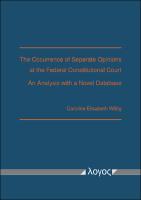The Occurrence of Separate Opinions at the Federal Constitutional Court
| dc.contributor.author | Wittig, Caroline | |
| dc.date.accessioned | 2022-06-18T05:31:46Z | |
| dc.date.available | 2022-06-18T05:31:46Z | |
| dc.date.issued | 2016 | |
| dc.identifier | OCN: 1021805268 | |
| dc.identifier.uri | https://library.oapen.org/handle/20.500.12657/56724 | |
| dc.description.abstract | Courts with the right to constitutional review exert considerable power in a political system. However, especially for Kelsenian constitutional courts there are hardly any large-N studies. This is mainly due to a lack of data. For the German Federal Constitutional Court, this gap has been closed by building a novel database, the development of which is depicted in this book. Employing data from this database, the occurrence of separate opinions in general and their different types in particular are analyzed. The book introduces a new, universal theory that reconciles and expands existing explanations. In a second step, the theory is applied to the German Federal Constitutional Court. It can be proven that one factor that has been neglected so far plays a decisive role: The judges' behavior depends on the profession they pursue after their time in office. Moreover, the study shows that -- contrary to the common literature -- it is not mainly the topic that determines a case's conflict potential but rather the number of issues a decision has to address. | |
| dc.language | English | |
| dc.subject.other | Law | |
| dc.subject.other | Political Science | |
| dc.title | The Occurrence of Separate Opinions at the Federal Constitutional Court | |
| dc.type | book | |
| oapen.identifier.doi | https://doi.org/10.30819/4411 | |
| oapen.relation.isPublishedBy | 1059eef5-b798-421c-b07f-c6a304d3aec8 | |
| oapen.relation.isFundedBy | b818ba9d-2dd9-4fd7-a364-7f305aef7ee9 | |
| oapen.relation.isbn | 9783832544119 | |
| oapen.collection | Knowledge Unlatched (KU) | |
| oapen.imprint | Logos Verlag Berlin | |
| oapen.identifier | https://openresearchlibrary.org/viewer/f894e1ac-5b1d-41d9-8b40-3927367b0ff1 | |
| oapen.identifier.isbn | 9783832544119 |

